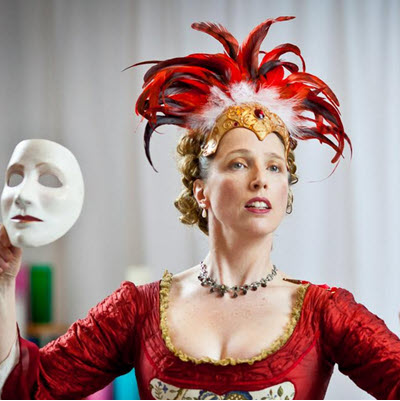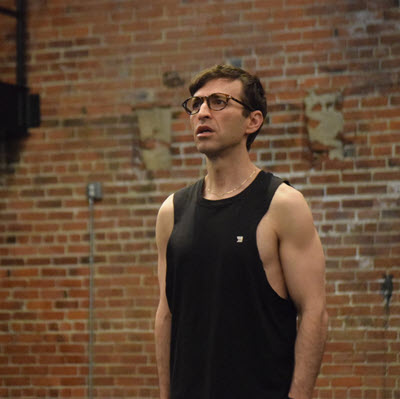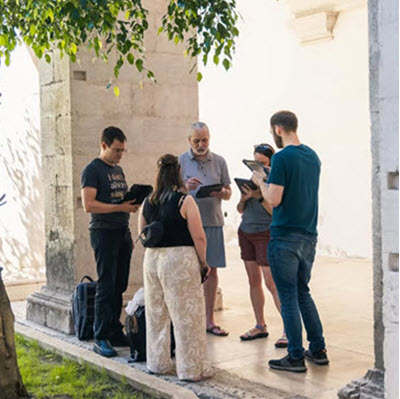by Simon Mundy
Published October 28, 2024
The Kyiv Baroque Festival shows Ukrainian culture as part of the pan-European continuum
In wartime, ‘the government has realized that performances are good for society and important for morale‘
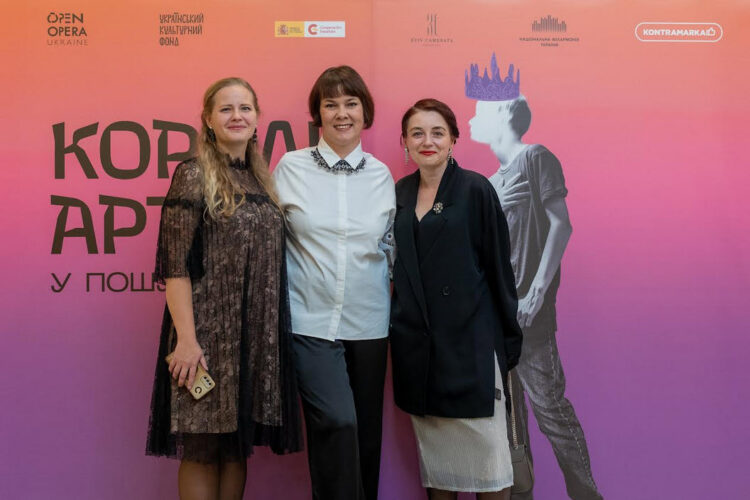
Despite daily air raids by Russian missiles and bombing drones, Ukraine’s capital is determined to keep its musical life active. In October, Open Opera Ukraine staged Purcell’s King Arthur (a bilingual semi-staging for a semi-opera).
Next month, November 14-22, 2024, the capital city holds the second edition of its Kyiv Baroque Festival.
As Anna Gadetska, the program director of both, explained: “The new acting director of the National Philharmonic, Mykhailo Shved, had the idea for a Baroque Festival last year and contracted me to program it. We started with a few concerts over three days, with the focus on Rameau and the theme of Utopia. I wanted to combine the idea with the world’s situation.”
This year, the Kyiv Baroque Festival runs for a full week, featuring Rameau again but also music by Dmitry Bortniansky (1751–1825), a Ukrainian composer and harpsichordist at the court of Catherine the Great. “Among Bortniansky’s works we have French musical dramas. To understand the figure of Bortniansky in the context of the French tradition, in particular Rameau, reveals the interconnections of the musical world of Europe from the second third of the 18th century to the beginning of the 19th century. I hope the focus of attention will contribute to the emergence of new opportunities for the representation of Ukrainian culture as part of the pan-European continuum. My main goal is to combine international and Ukrainian music and to bring in international artists where I can.”
A triumvirate of women are driving early music in Kyiv
This year, star countertenor Andreas Scholl is scheduled to headline the festival’s closing concert, singing Bach and Vivaldi cantatas with the Liatoshynskyi Ensemble and Choir of the National House of Music, conducted by Nataliia Khmilevska, the artistic director of Open Opera Ukraine.
Conductor Khmilevska, program director Gadetska, and general producer Galyna Grygorenko are the triumvirate of women driving the development of early music in Kyiv.
All the concerts will be held in the National Philharmonic which, despite the grand title, is quite small, with the main hall holding 600 people — home of the National Symphony Orchestra — and a studio hall seating just 50. Many of the other Kyiv ensembles are part of the National House for Music — an organization, as Grygorenko explains, “inherited from Soviet times.” It was long housed in Kyiv’s Catholic Cathedral until a fire in 2021 but is now in temporary venues while the cathedral is being reconstructed. The House of Music “acts as a concert promoter but also a resource center…and has the only portable organ and theorbo in Kyiv.”
Air raids and Opera
More than two years into the war, “the venues in Kyiv are working,” Grygorenko told me, “but if an alarm goes off we all head to the basement. All the main venues now have bomb shelters in the basement. They did not have them at the start of the full-scale invasion.” Ukrainians always refer to the start of the general war in Feb. 2022 as the “full-scale invasion” to differentiate it from Russia’s invasion and annexation of Crimea and the proxy takeover of eastern territory from 2014 onward.
“Before the war, all the basements were used for storage. But the venues have cleaned them up and strengthened them,” she continues. “Once the all-clear is sounded the performances continue from the moment they stopped. This is a real challenge for the singers and actors, and even the audience — to click straight back into the atmosphere and the emotions of the work.”
Program director Gadetska says that “air raids happen almost every day — usually in the early morning when people are going to work and the children to school. There is not so much in the evening. In our performances of King Arthur there were none, which was amazing, but last Wednesday they had to stop the show in the Drama Theatre after the first half. It was impossible to continue. So it was rescheduled: the first half happened on [this past] Wednesday and the second on Sunday.”
Gadetska adds, “the daytime raids really mess up rehearsals, though. For some of the smaller early music rehearsals we can move them to the basement, but it is not ideal.”
‘It takes bravery to come here’
As well as the miseries of living in a war zone, the logistics of getting to Kyiv these days are very complicated, even for the Terra Barocca Ensemble, who are coming over from Lviv, close to the border with southern Poland and the least damaged (though not unscathed) major city in Ukraine.
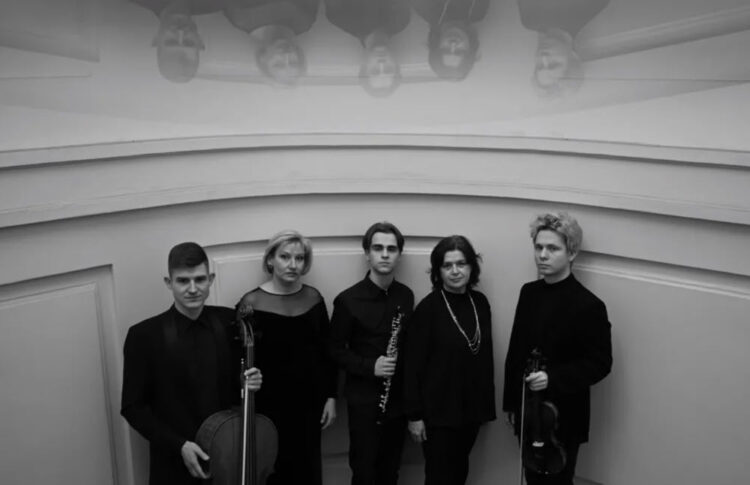
“It takes bravery to come here,” says Gadetska. “Andreas Scholl is coming to Kyiv for the first time. He has to fly from Frankfurt to Warsaw, then get the train for 12 hours,” including the stop at the border to change carriages from the European-gauge rails to the wider old Russian gauge, “then there are the security protocols and the risk of attack from the air.” Gadetska laughs, “and his agent in London could not understand why it was not possible for him to fly straight home the day after the concert.” The festival opens with harpsichordist Jean Rondeau making a similar journey from France.
“My dream,” says Gadetska, “is to have collaborations with international musicians and academics and to program Baroque with contemporary music because now we are seeing Ukrainian composers starting to write for early-music ensembles.”
The academic side is important as well: they are all aware that Ukraine has lagged behind other eastern European countries in its research and understanding of pre-19th-century music. The Kyiv Baroque Festival includes a parallel program of seminars and discussions on 15 November, with many participants joining online from other countries.
“We need money, of course, but what we really need is education,” says Gadetska. “We do not have the teachers here, for example of Baroque oboe, bassoon, or viola da gamba. There are excellent harpsichord teachers, but not of early violin or cello. It is also a big problem to find Baroque instruments here, especially good ones. We do have some makers. There is a good maker of recorders, Yevhen Illarionov, and one of keyboards, Dmytro Titenko. But very few others who are up to international standards.”
Many of Ukraine’s best musicians, she says, have fled from the war and now have careers somewhere else in Europe. “We have had to start again from zero.” At the same time, “men of fighting age are not allowed to leave the country. The war has thrown us back by several years, in terms of developing high-quality technique and style. But at Open Opera Ukraine we are beginning to discover new talents. We are playing on modern instruments but with a Baroque style. King Arthur was magnificent, and we had a great cast of young singers and actors, with drive and fresh energy. I am sure that at least two, with real stage presence, will become stars.”
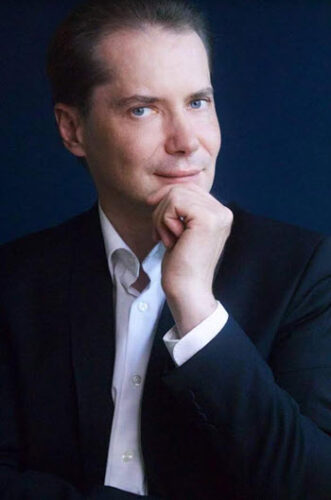
Mykhailo Shved, the National Philharmonic director, is determined that his theater’s “efforts in early music should be systemic, not just the Baroque festival.” He went on to make clear exactly what he and the musicians in Kyiv are having to deal with: “The war has meant we have had so many people leave — some, about 20, men to the army and many women to other countries. At least the national ensembles have been designated as ‘reserve,’ which means only half the men can be called to fight. The government has realized that performances are good for society and important for morale.”
At the moment, Kyiv is dangerous, albeit more peaceful than many other places in the country. “Things are different here in Kyiv than in cities in the east, like Kharkiv and Donetsk, which are either under constant attack or are occupied. While many of our musicians have left, since the invasion many of those internally displaced artists have come to Kyiv and been employed here.”
Inevitably, money for the arts is an issue and Ukraine’s economy was not exactly flushed with funds even before the war diverted so much to the military. “The government is supporting most, but not all, of our wage bill. For the remainder, as well as productions and projects, we have to rely on tickets and donors. Money for building repairs and any capital projects has dried up. Things are not normal. But donors have supported us and continue to invest. And we are proud that ticket sales are back to where they were before the COVID pandemic.”
I wondered how America should respond to Kyiv’s predicament. “People in the music world could help by publishing and playing Ukrainian music,” Mykhailo replies. “Bring our societies closer, get to know us better and, if they are brave enough to come, we are always open to propositions. It may seem strange to say [coming from] someone in music, but the best way people in the West can support us is by asking their governments to continue supplying weapons. If we have the right weapons our musicians will not have to go to the front and swap their instruments for guns. Things are difficult but not too bad in Kyiv. In the east, though, artistic life has nearly all disappeared. If the front line comes closer, the same will happen in Kyiv, too.”
Simon Mundy has been writing about music for fifty years. Otherwise, he is a poet and novelist. He also advises the European Festivals Association and the Chamber Orchestra of Europe. He lives in Scotland. For Early Music America, he recently wrote about Versailles Spectacles at 400.

